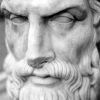There's a group on Facebook that I like a lot -- it's called "Promote Awareness of the Emotional and Intelligent Lives of Animals." It highlights books and articles that describe how much animals sometimes share with humans in terms of cognitive abilities and affective states.
I'm curious: How effective would it be for animal advocates to publicize these types of findings? For instance, would this be a good way to make people care about wild-animal suffering? Better than promoting vegetarianism?
I ask because I think that would have been true in my case. For many years, I scoffed at vegetarians because I thought animals were cognitively inferior to humans to an extent that they didn't really feel pain in a bad way. It was only upon reading Singer's "Do Animals Feel Pain?" that I realized that animal emotions even mattered. At that point, vegetarianism (and lots of associated conclusions) followed naturally.
That said, I worry about two things:
(1) Cognitive biases tend people toward optimism (see section 5 of this piece), coupled with the fact that the humans we're talking about live relatively comfortable lives. One's own internal affective state makes a huge impact on one's assessment of the overall quantities of happiness and suffering that exist, and most people making decisions about these matters do so in the comfort of their temperature-controlled, predator-free, and food-stocked homes and offices.
(2) Even people who agree that wild animals suffer more than they're happy often still favor wilderness preservation, because they value things (like beauty, complexity of ecosystems, or natural evolutionary processes) apart from subjective experiences by individual organisms. In fact, I've met only a handful of non-utilitarians to whom the idea of letting nature vanish is not repugnant. One friend of mine is even dedicated to spreading life throughout the universe as widely as possible even though he agrees wildlife suffer enormously.
So, in addition to highlighting how much animals are similar to humans, it's important as well to remind people that the circumstances in which most animals live are quite different and that those differences matter a lot in answering the question of how best to help wild animals.
Finally, I wonder whether promoting awareness of animal emotions may not be necessary for most people. To many pet owners, for instance, a dog's ability to feel pain is obvious. Maybe it tends to be the overly academic and rationalist crowd that has the hardest time acknowledging animal suffering -- I think my own former skepticism about animal pain derived from some weird notion that language was essential for subjective experience. In this case, highlighting intellectual portrayals of animal abilities might appeal to just a small minority of the population; perhaps there are better strategies for "the average Joe"?
Of course, it's also worth asking which people are most important to influence. With respect to vegetarianism, perhaps any type of person is roughly the same, but with respect to changing future memes, it's those who will shape the future of public opinion who matter most. Who are those people, by the way?
I'm curious: How effective would it be for animal advocates to publicize these types of findings? For instance, would this be a good way to make people care about wild-animal suffering? Better than promoting vegetarianism?
I ask because I think that would have been true in my case. For many years, I scoffed at vegetarians because I thought animals were cognitively inferior to humans to an extent that they didn't really feel pain in a bad way. It was only upon reading Singer's "Do Animals Feel Pain?" that I realized that animal emotions even mattered. At that point, vegetarianism (and lots of associated conclusions) followed naturally.
That said, I worry about two things:
(1) Cognitive biases tend people toward optimism (see section 5 of this piece), coupled with the fact that the humans we're talking about live relatively comfortable lives. One's own internal affective state makes a huge impact on one's assessment of the overall quantities of happiness and suffering that exist, and most people making decisions about these matters do so in the comfort of their temperature-controlled, predator-free, and food-stocked homes and offices.
(2) Even people who agree that wild animals suffer more than they're happy often still favor wilderness preservation, because they value things (like beauty, complexity of ecosystems, or natural evolutionary processes) apart from subjective experiences by individual organisms. In fact, I've met only a handful of non-utilitarians to whom the idea of letting nature vanish is not repugnant. One friend of mine is even dedicated to spreading life throughout the universe as widely as possible even though he agrees wildlife suffer enormously.
So, in addition to highlighting how much animals are similar to humans, it's important as well to remind people that the circumstances in which most animals live are quite different and that those differences matter a lot in answering the question of how best to help wild animals.
Finally, I wonder whether promoting awareness of animal emotions may not be necessary for most people. To many pet owners, for instance, a dog's ability to feel pain is obvious. Maybe it tends to be the overly academic and rationalist crowd that has the hardest time acknowledging animal suffering -- I think my own former skepticism about animal pain derived from some weird notion that language was essential for subjective experience. In this case, highlighting intellectual portrayals of animal abilities might appeal to just a small minority of the population; perhaps there are better strategies for "the average Joe"?
Of course, it's also worth asking which people are most important to influence. With respect to vegetarianism, perhaps any type of person is roughly the same, but with respect to changing future memes, it's those who will shape the future of public opinion who matter most. Who are those people, by the way?


